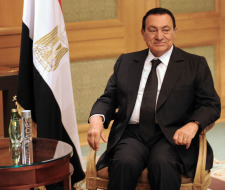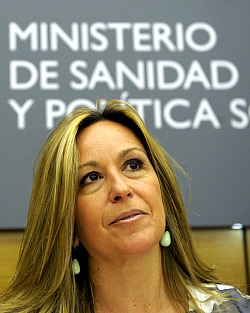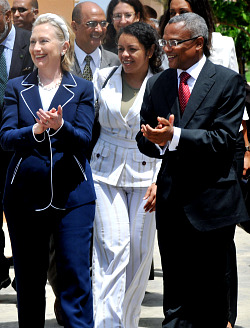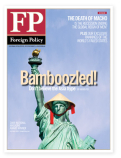Global News : Passport : Ricks : Drezner : Walt : Rothkopf : Lynch
The Cable : The AfPak Channel : Net Effect : Shadow Govt. : The Argument : The Call
Azerbaijanis face Eurovision probe

Three months after this year's Eurovision Song Contest, an unconfirmed number of Azerbaijanis who voted for the Armenian entry have been brought in for questioning by the police. One man said he was accused of being unpatriotic and a "potential security threat." Authorities said people were simply invited to explain their voting choices.
Azerbaijan and Armenia have a history of strained relations, largely over territorial claims that remain unresolved. Last November, leaders of the neighboring countries pledged to find a political solution to the disputed Nagorno-Karabakh region, over which the two fought in the 1990s. Little progress, however, seems to have been made since.
Broadcast live every May since its inaugural telecast in 1956, Eurovision is today a cultural institution, and the epitome of Kunderian kitsch. Despite the organizers' aspirations for an apolitical competition, historic undercurrents inevitably surface on screen. Habitual incidences of bloc voting occur, and in March Georgia's entry "We Don't Wanna Put In" was banned for its thinly-veiled reference to the Russian prime minister.
In Azerbaijan, 43 people are believed to have voted for Armenia's entry "Jan Jan," pictured above.
Oleg Nikishin/Epsilon/Getty Images
The camels that broke Australia's back

A new proposal in Australia plans to slaughter thousands of camels that are wrecking havoc in the outback.
First introduced to the country in the 1840s to help explorers traverse the harsh deserts, feral camels now number more than one million, with a population that doubles in size every nine years. The herds roam unchecked through much of central and western Australia, destroying sacred indigenous sites and fragile ecosystems alike. Traveling in large, intimidating packs, they compete with livestock for food, trample vegetation and ravage residents' homes in search of food and water.
Last month the federal government set aside $15.6 million dollars for a "camel reduction program" that needs to drastically reduce the population down to at least a third of its present size to avoid "catastrophic damage". So far the most practical strategy seems to be a cull, with sharpshooters in helicopters firing on large groups -- an "actually quite humane" plan, according to some. This is good news for certain farmers, who are looking to expand the market for camel meat, reportedly an excellent source of low cholesterol protein. Alternative suggestions, including exporting the camels or instituting a mass sterilization policy, are thought of as unfeasible given the animals' enormous size and aggressiveness.
Unsurprisingly, animal welfare activists are deeply disturbed by the proposals, but criticism for the government is also coming from an unexpected outlet: the foreign media. American broadcaster CNBC referred to the plans as "camelcide" and dubbed Australian Prime Minister Kevin Rudd a "serial killer." Similarly, hosts of a program on China's Central TV are calling the government out for its "massacre...of innocent lives."
Ezra Shaw/Getty Images
Advertisement
Huckabee rejects a two-state solution
Mike Huckabee, former governor of Arkansas and Republican presidential hopeful, has never been known for his foreign-policy prowess. Wonder why?
At a junket hosted by a far-right Israeli religious group, he rejected a two-state solution for the Israel-Palestine conflict. The two-state solution both Israeli and Palestinian leaders say they want. The two-state solution virtually every U.S. politician, conservative or liberal, supports. The two-state solution essentially the entire world agrees offers the best hope for peace.
Morning Brief: Mubarak Visits Washington

Top Story: For the first time in five years, Egyptian President Hosni Mubarak is visiting the White House, meeting with U.S. President Barack Obama and other dignitaries and political leaders. Yesterday, Mubarak discussed the stalled Middle East peace process with Secretary of State Hillary Clinton; he is expected to do the same today with Obama.
The current U.S. administration is hoping that it can use Egypt as an interlocutor and mediator in the Middle East -- and particularly, Israel and Palestine. For more comprehensive detail on the visit, see Foreign Policy's coverage on The Cable blog by Laura Rozen and by Issandr Amrani.
To Watch: A suicide bomb attack hit a NATO convoy in Afghanistan, killing 7: the first sign of the violence sure to amplify before the country's presidential election on Thursday. The Taliban and various other extremist groups have vowed to attack and disrupt the election.
Middle East
- After a meeting between U.S. Secretary of State Hillary Clinton and Mubarak, a State Department spokesperson said the U.S. had recommitted to talks between Israel and Palestine.
- The United States said it would free members of an Iraqi insurgency group which is known to have killed Americans as a gesture of reconciliation.
- The ex-wife of a groom at a wedding in Kuwait admitted she started a fire which killed 43 guests.
- Palestinian Authority President Mahmoud Abbas condemned the violent fighting between Hamas factions, which killed at least 24 over the weekend.
- Kim Dae-jung -- a former left-wing dissident, a Nobel Peace Prize winner, and the former president of South Korea -- died at the age of 83.
- Tens of thousands of supporters of ousted Thai Prime Minister Thaksin Shinawatra, the "Red Shirts," presented a petition seeking his pardon.
- Heavy rains continued to soak a 230,000-person Sri Lankan refugee camp, blighted by disease and disarray.
- The South Korean government distanced itself from a deal to restart tourist visits to the North, but said it welcomed state-to-state talks.
- Frederick Chiluba, the former president of Zambia, was acquitted on charges of embezzling $500,000 from the government.
- A Scottish court cleared one obstacle to the release of the Lockerbie bomber, who has terminal cancer and is attempting to return to Libya.
- Tumult continues to seize the Nigerian banking market, after the government bailout of five major banks and the suspension of some banking shares.
- The U.S. Peace Corps has withdrawn its 100 workers from Mauritania, citing safety concerns.
- The Russian Navy interrogated the crew of a cargo ship which went missing from the English Channel at the end of July and appeared off the coast of Cape Verde this weekend. They said they arrested 8 hijackers and freed the rest of the crew -- all without firing a shot.
- Governments across Europe prepare to inoculate millions against the H1N1, or Swine Flu, virus.
- Dozens of workers in a remote Siberian hydroelectric plant died in an dam accident.
- Speaking to veterans, U.S. President Barack Obama yesterday called Afghanistan a war of "necessity," not "choice," and reiterated his intention to build a leaner fighting force.
- In the continued August congressional recess debate over U.S. health insurance reform, some Democrats said they would endorse insurance co-ops over a public option.
- Brazil said it is seeking more control over the extraction of oil found under its ocean.
Spain's health minister kisses own advice goodbye

Spanish Health Minister Trinidad Jimenez launched a new
health campaign with recommendations to guard against the spread of swine
flu by encouraging people to wash hands frequently, avoid sharing glasses and
to refrain from kissing where possible. But just moments before she made her
statement, the minister was caught kissing news conference assistants twice on
the cheek. Though a common social custom, local media wasted no time in
capturing the irony, as weekend papers splashed pictures of Jimenez failing to
practice what she preached. To date, Spain has accredited 11
deaths to the virus, giving it the second highest fatality rate in Europe.
PHILIPPE DESMAZES/AFP/Getty Images
Hillary's headband makes a comeback
 It seems the most comment-worthy aspect of U.S. Secretary of
State Hillary Clinton's visit to Cape Verde last Friday was neither her meeting
with Prime Minister José Maria Neves nor the praise she
heaped on the government as a "model of democracy and economic progress in
Africa." It was her headband.
It seems the most comment-worthy aspect of U.S. Secretary of
State Hillary Clinton's visit to Cape Verde last Friday was neither her meeting
with Prime Minister José Maria Neves nor the praise she
heaped on the government as a "model of democracy and economic progress in
Africa." It was her headband.
In a rare nod to her stylings as first lady, Clinton sported a beloved accessory that's been missing on the political scene for more than a decade -- with good reason. Please, please send it back to wherever it came from. Headbands don't suit anyone over the age of eight, least of all a secretary of state who's trying desperately to be taken seriously.
I'm sure she was fighting some frizz after her grueling, 11-day, seven-nation tour of Africa last week, but that's really no excuse.
STR/AFP/Getty Images
Headline of the day: "The CIA, Siberia, and the $5m bar bill"

Wired correspondent Sharon Weinberger has a compelling investigative piece in the New York Post about the CIA's quest for Russian helicopters to sneak into Afghanistan before the full-scale U.S. invasion. It's a tale of secrecy, corruption, Siberian cold, and credit card rewards.
Here's a bit of Weinbeger's synopsis at Wired's Danger Room:
As with many “black” programs, the contract had elements of craziness: Contracting officials paid the multimillion-dollar contract on a credit card at a local El Paso bar and then used the credit card rebate to redecorate their office; the team traveled under the guise of being private contractors; and the charter crew transporting the group abandoned the team in Russia in the middle of the night.
Ultimately, a five-year investigation into the mission led to the conviction of the Army official in charge and the contractor who bought the helicopters on charges of corruption. The two men, currently in federal prison, are appealing their convictions.
The full article is a thrilling read.
For more of Weinberger's coverage of questionable helicopter contracting, check out her April piece, "How to get a no-bid contract for Russian choppers." Turns out being a middleman in U.S.-Russian arms deals is pretty lucrative.
When U.S. taxpayers shell out for these kinds of shenanigans, at least we're getting some entertainment value.
Above, Russian Mi-17s in 2007.
SERGEY PONOMAREV/AFP/Getty Images
New source of anti-Americanism: offending Bollywood
 Bollywood fans in India's northern city of Allahabad burned a U.S. flag and shouted anti-American slogans to protest treatment of Bollywood star Shah Rukh Khan (seen at right). Khan was stopped and held for questioning as he entered the U.S. in Newark, NJ.
Bollywood fans in India's northern city of Allahabad burned a U.S. flag and shouted anti-American slogans to protest treatment of Bollywood star Shah Rukh Khan (seen at right). Khan was stopped and held for questioning as he entered the U.S. in Newark, NJ.
U.S. customs officials say that the questioning was standard procedure, that the delay lasted only 66 minutes and that it was made worse by the fact that the actor's bag was lost by the airline. In India, however, the perceived offense was much greater, the AP reports:
"Shocking, disturbing n downright disgraceful. It's such behavior that fuels hatred and racism. SRK's a world figure for God's sake. Get real!" actress Priyanka Chopra said on her Twitter feed.
The federal information minister, Ambika Soni, angrily suggested that India adopt a similar policy toward Americans traveling to India.
Khan, visiting the U.S. to celebrate Indian Independence day at a parade in Chicago, is also working on a new film called "My Name is Khan" about racial profiling of Indian muslims in the U.S. as potential terrorists.
Perhaps grateful for the unexpected marketing boost, Khan later said he did not want an apology. But he added that his patience with American customs was wearing thin (he said this is not the first time something similar has happened) and that he might seek to spend more time in countries that know their Bollywood stars on sight:
"Post-9/11, one could understand and one did not complain. But this time it was a bit too much. I have travelled to other countries. I never faced any problem in the UK where I am treated like a state guest. They escort me to the car."
STR/AFP/Getty Images
- South Asia | Culture | India
















Recent comments
4 min 9 sec ago
3 hours 7 min ago
3 hours 20 min ago
5 hours 29 min ago
9 hours 46 min ago
9 hours 47 min ago
12 hours 37 min ago
12 hours 49 min ago
14 hours 7 min ago
14 hours 10 min ago